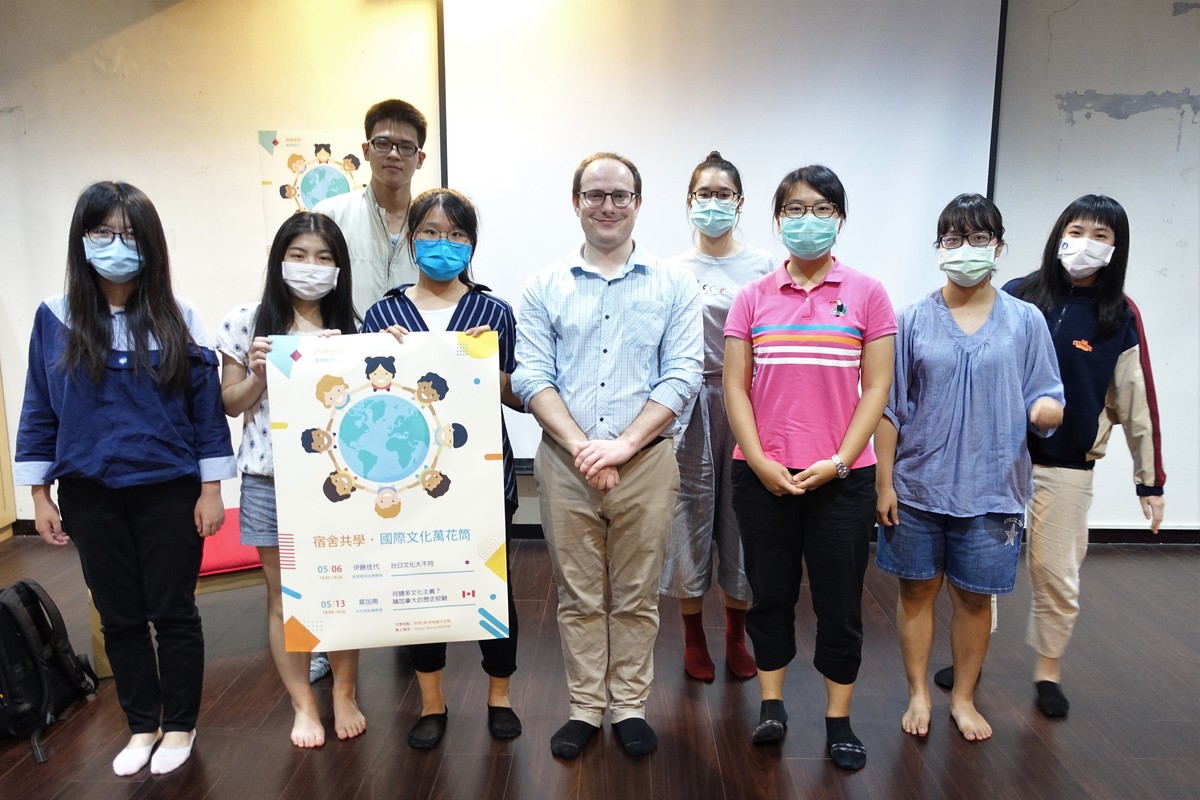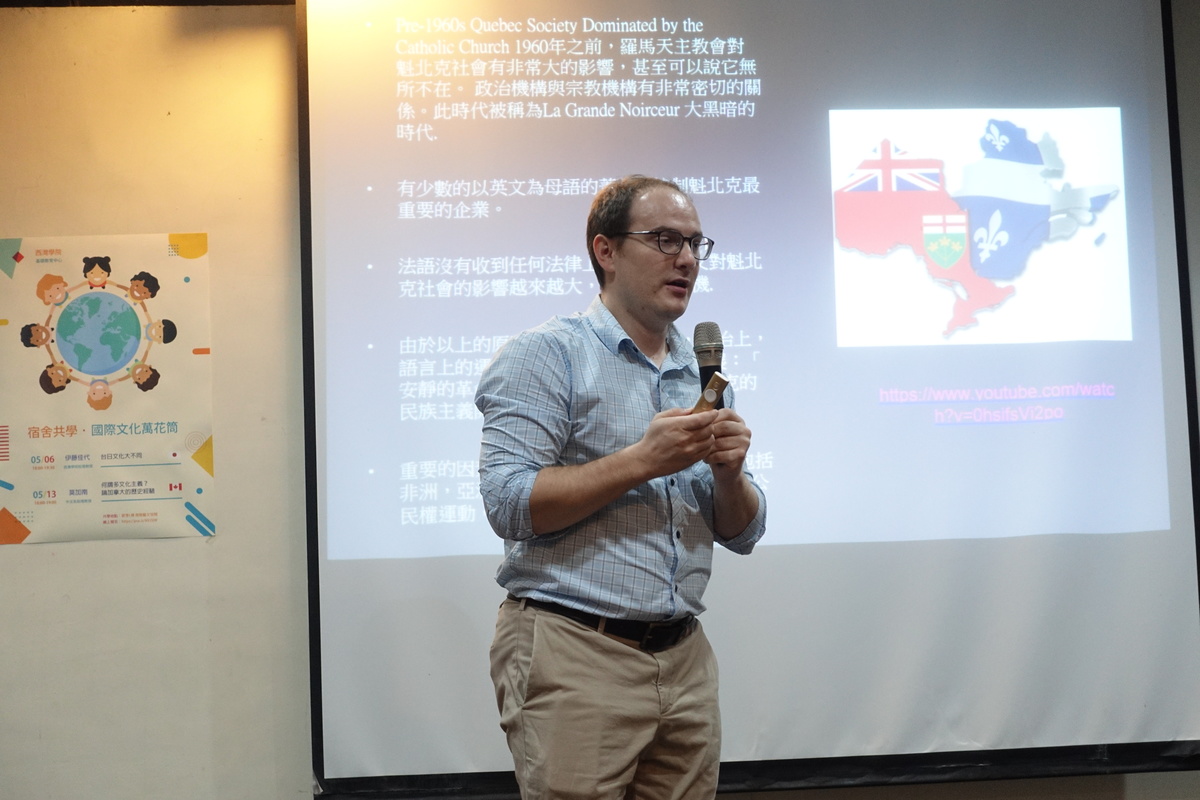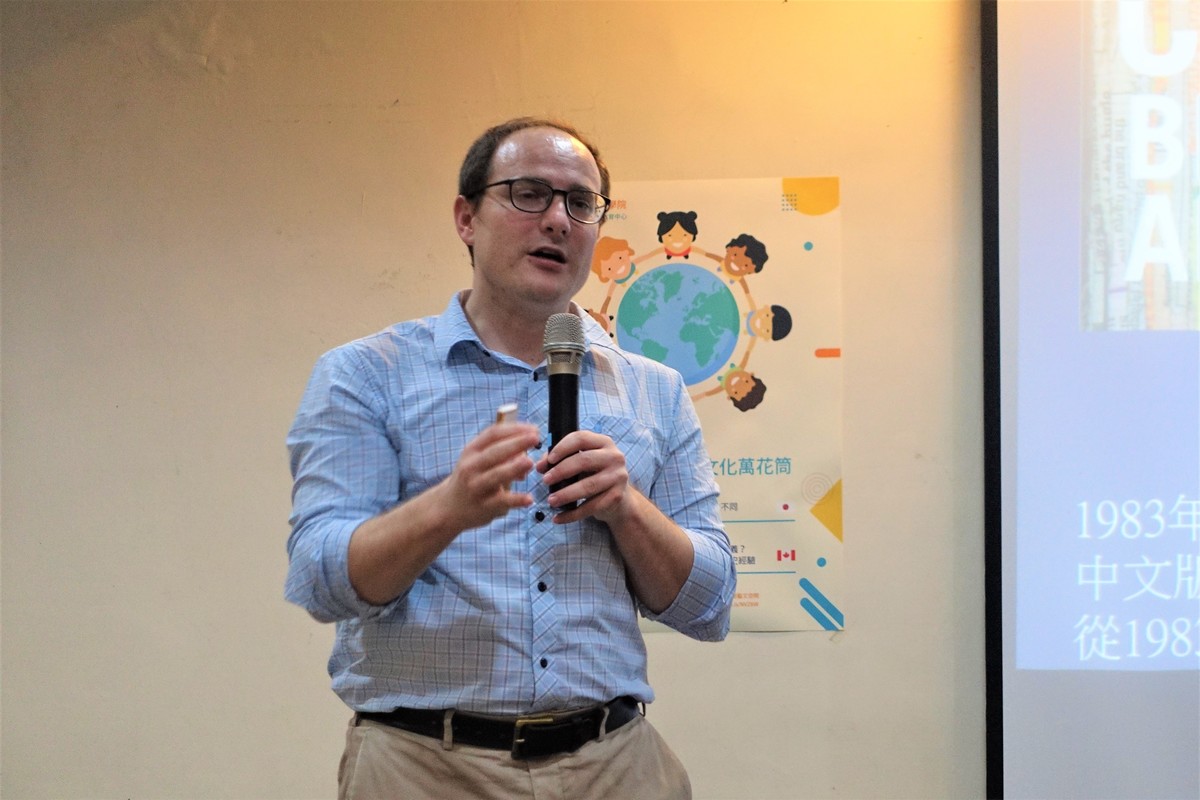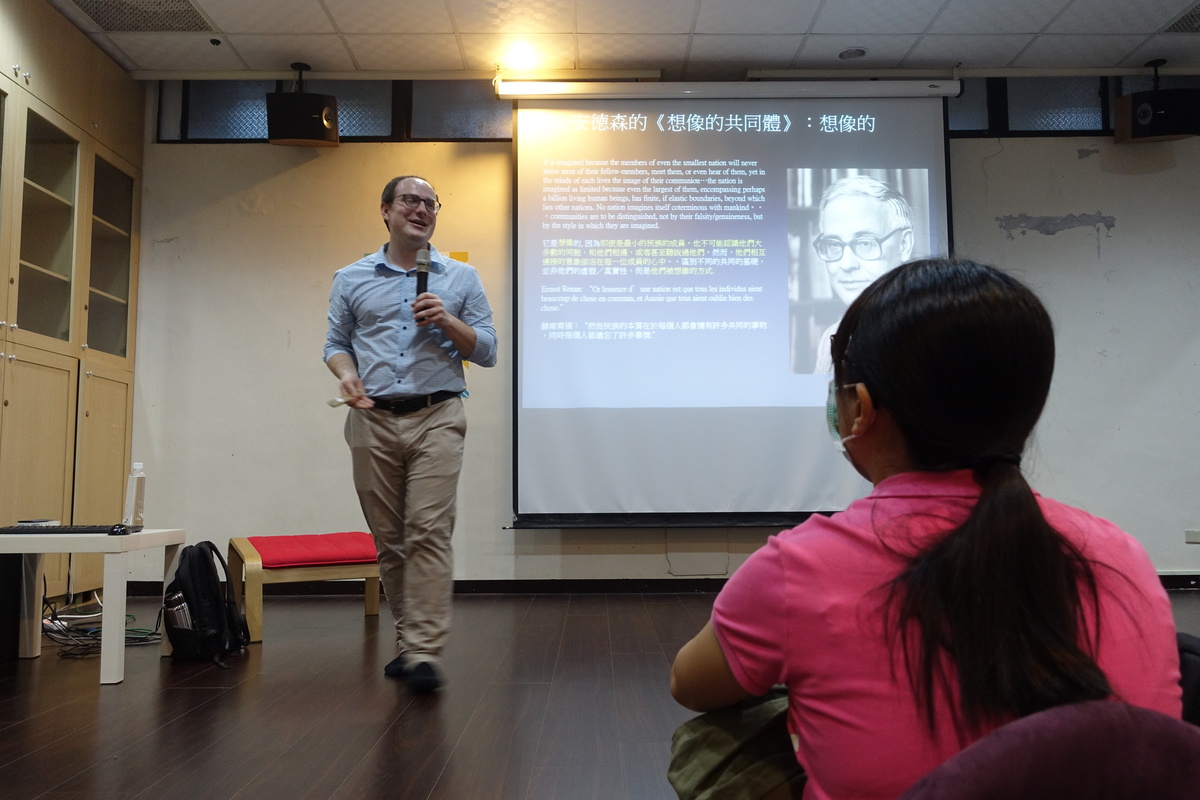Assistant Professor Mark McConaghy gives a talk on cultural diversity in his native Canada




(Report by student journalist) Assistant Professor of the Department of Chinese Literature Mark McConaghy, who comes from Canada, was invited by Si-Wan College to give a speech about cultural diversity in his native Canada. The speech was part of the series of lectures - Co-Working at Dorms. Besides the transition of Canada from a colony to an independent country, the past and present of the Quebec province, Professor McConaghy also brought up hidden and forgotten historical issues, to emphasize the diversity of Canadian culture and promote an approach of tolerance and respect towards different societal groups.
By presenting Imagined Communities by Benedict Anderson, Professor McConaghy explained that the identification with one’s community is rooted in self-cognition and that people can still identify as one nation in spite of a different place of birth, race or even culture. Even though an average Taiwanese might know less than 0.1% of his/her 23 million nation, total strangers will both recognize each other as Taiwanese. A Canadian from Vancouver will be seen as Canadian even 4000 km away in Toronto, after spending 6 hours on the plane to get there. These are examples of national identity, which is not influenced by the distance nor relation between people.
Professor McConaghy asked, who writes the history of such diverse communities? Present-day Canadian territories used to be the colonies of the British Empire and France. Both countries fought over the territories in North America, which resulted in military conflicts. France lost the war and handed the Quebec province over to the British Empire. However, most of the residents of the region were French. This presented a challenge for cultural integration within the dominion. He also noted that when the American War of Independence broke out, American colonists who supported British rule immigrated to Canada, establishing a “more British than Britain” settler colonial culture. They were proud of their British accent and made fun of those who spoke French, promoting the view that English is the representative language of white people (speak white).
Decades later, when Canada formally became an independent country in 1867, its ties to Britain gradually weakened. The 1960s was a time of global decolonization. French Canadians were becoming more and more dissatisfied with being marginalized for speaking French; finally, they were acknowledged by the Canadian government, which instituted French as one of the official languages and introduced it to public schools. During this time, Montreal, as a bilingual city within Quebec, became a crucial contact zone between the “two solitudes”. About the independence of Quebec, Professor McConaghy said that while opinions vary, the consensus is that such independence cannot be achieved by violent means but has to be decided via referendum. In the eyes of its citizens, Canada is a culturally diverse country in which pluralism between many peoples must be respected.
What is more, the indigenous population gives an account of a forgotten part of Canadian history. He pointed out that from the late 19th century onward, the indigenous population living in Canada was forced to send children to schools, learn English, work, adopt a new religion, and assimilate into a white Christian ethno-national culture, “become white”. “It was a cultural genocide”. Ten years ago, the Canadian government established the Truth and Reconciliation Commission to start recording this part of history and incorporate it into textbooks. However, there is still a long way to reconciliation between both parties.
Assistant Professor Mark McConaghy said that both Canada and Taiwan had to face “otherness” (different linguistic, racial, and political groups integrating into the body politic) during various historical periods, and strive for tolerance in a diverse society. Historically, nor Canada, nor Taiwan paid much attention to the way the majority (white people, ethnic Han people) treats minorities (indigenous population). This would not be discussed in class, nor gain wider public awareness. In recent years, both societies have understood that society cannot further marginalize the earliest residents and protectors of the country’s land and started to recognize the importance of the history of the indigenous population.
Chih-Yun Chiu, a Chinese Literature student, said that having listened to the lecture of Professor McConaghy, born and raised in Canada, made him realize that Canada is a cultural melting pot just like the USA, and he was stunned to learn about the forgotten history of the indigenous people in this country. He also tried to look at Taiwan’s culture from a Western point of view and adopt a wider research perspective to explore less visible viewpoints.
(Edited by Public Affairs Division)
By presenting Imagined Communities by Benedict Anderson, Professor McConaghy explained that the identification with one’s community is rooted in self-cognition and that people can still identify as one nation in spite of a different place of birth, race or even culture. Even though an average Taiwanese might know less than 0.1% of his/her 23 million nation, total strangers will both recognize each other as Taiwanese. A Canadian from Vancouver will be seen as Canadian even 4000 km away in Toronto, after spending 6 hours on the plane to get there. These are examples of national identity, which is not influenced by the distance nor relation between people.
Professor McConaghy asked, who writes the history of such diverse communities? Present-day Canadian territories used to be the colonies of the British Empire and France. Both countries fought over the territories in North America, which resulted in military conflicts. France lost the war and handed the Quebec province over to the British Empire. However, most of the residents of the region were French. This presented a challenge for cultural integration within the dominion. He also noted that when the American War of Independence broke out, American colonists who supported British rule immigrated to Canada, establishing a “more British than Britain” settler colonial culture. They were proud of their British accent and made fun of those who spoke French, promoting the view that English is the representative language of white people (speak white).
Decades later, when Canada formally became an independent country in 1867, its ties to Britain gradually weakened. The 1960s was a time of global decolonization. French Canadians were becoming more and more dissatisfied with being marginalized for speaking French; finally, they were acknowledged by the Canadian government, which instituted French as one of the official languages and introduced it to public schools. During this time, Montreal, as a bilingual city within Quebec, became a crucial contact zone between the “two solitudes”. About the independence of Quebec, Professor McConaghy said that while opinions vary, the consensus is that such independence cannot be achieved by violent means but has to be decided via referendum. In the eyes of its citizens, Canada is a culturally diverse country in which pluralism between many peoples must be respected.
What is more, the indigenous population gives an account of a forgotten part of Canadian history. He pointed out that from the late 19th century onward, the indigenous population living in Canada was forced to send children to schools, learn English, work, adopt a new religion, and assimilate into a white Christian ethno-national culture, “become white”. “It was a cultural genocide”. Ten years ago, the Canadian government established the Truth and Reconciliation Commission to start recording this part of history and incorporate it into textbooks. However, there is still a long way to reconciliation between both parties.
Assistant Professor Mark McConaghy said that both Canada and Taiwan had to face “otherness” (different linguistic, racial, and political groups integrating into the body politic) during various historical periods, and strive for tolerance in a diverse society. Historically, nor Canada, nor Taiwan paid much attention to the way the majority (white people, ethnic Han people) treats minorities (indigenous population). This would not be discussed in class, nor gain wider public awareness. In recent years, both societies have understood that society cannot further marginalize the earliest residents and protectors of the country’s land and started to recognize the importance of the history of the indigenous population.
Chih-Yun Chiu, a Chinese Literature student, said that having listened to the lecture of Professor McConaghy, born and raised in Canada, made him realize that Canada is a cultural melting pot just like the USA, and he was stunned to learn about the forgotten history of the indigenous people in this country. He also tried to look at Taiwan’s culture from a Western point of view and adopt a wider research perspective to explore less visible viewpoints.
(Edited by Public Affairs Division)
Click Num:
Share
